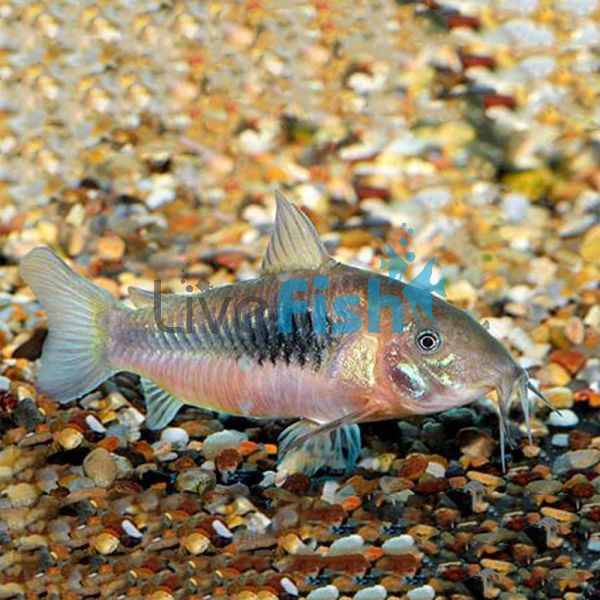Bronze Corydoras 5cm
Corydoras or commonly called cories are a staple fish for any tropical community aquarium, they are hardy, super active, and have tonnes of benefits as well. The Corydoras family has hundreds of different species of all different shapes, colors, and sizes but the most common of them all is the bronze corydoras. Though initially, they may seem bland in color the bonze Corydoras has an array of browns, blacks, pinks, and even an amazing jade green sheen to them.
Bronze Corydoras
Corydoras or commonly called cories are a staple fish for any tropical community aquarium, they are hardy, super active, and have tonnes of benefits as well. The Corydoras family has hundreds of different species of all different shapes, colors, and sizes but the most common of them all is the bronze corydoras. Though initially, they may seem bland in color the bonze Corydoras has an array of browns, blacks, pinks, and even an amazing jade green sheen to them.
This really comes out when they reach their adult size and with selective breeding efforts, the bronze Cory can even be found in an albino and long-fin form. One of the greatest benefits to Corydoras is their habit to constantly stir the substrate layer, they act like mini bulldozers sometimes shoving their entire face into the sand bed searching for food which in turn makes sure it stays turned over.
They are also bottom-dwelling fish and are an awesome option to add some life to the bottom of the tank. They are not shy fish and are constantly actively making them a great and popular fish for community and planted aquariums, Corydoras are also considered to be schooling catfish, in the wild they are often seen in groups of a few hundred however in the home aquarium it is recommended to keep at least 3 or more. An ideal school would be around 6 plus individuals to really make them feel comfortable and to add some activity to the tank. The bronze Corydoras are incredibly peaceful and remain fairly small at 7cm max.
They are also bred fairly easily in captivity where they will scatter eggs often on the aquarium glass resulting in a fun breeding project. differentiating males and females are possible where the males are often smaller and narrower compared to the larger-bodied females. However, the best method to identify is to get a pack of 4-6 Corydoras and let a pair naturally form. The wild origin of the bronze corydoras is South America.
Tank Recommendations for your Bronze Corydoras
Being a small catfish, bronze Corydoras can be kept in smaller aquariums however the minimum would be around 60 liters (20 gallons). This ensures that there is enough space for a school of Corydoras along with any other tank mates. A sand substrate is best as coarser substrates like gravel often result in Corydoras damaging their barbels.
Suitable Tank Buddies
Bronze Corydoras is an incredibly peaceful fish which can be kept with an absolutely massive range of community aquarium. They do not display any aggression if when breeding and make for a perfect addition even with sensitive or shy fish. The only factor which should be considered is that Corydoras are almost exclusively a bottom-dwelling species which means that any super active or large top dwelling fish may outcompete the corydoras for food.
Usually Compatible
community fish such as rams, tetras, angelfish, discus, rainbow fish, and many more.
Sometimes Compatible
Larger peaceful South American cichlids such as Uaru, Severums, and other fish may out-compete them as they are mostly bottom-dwelling fish.
Rarely Compatible
Large and aggressive species such as the Oscars may prey on the Corydoras. This is especially important as Corydoras have spines on their pectoral fins like many catfish, this can result in both the corydoras and the predator fish’s death.
Feeding your Bronze Corydoras
Bronze cories are very easy to feed. They will take a wide range of pellets, flakes, and frozen foods. Just like any fish though they should be fed a varied diet with a mix of different foods. The ideal diet would be a good quality micro slow sinking pellet or crushed flake, supplemented with frozen bloodworms or black worms or even live foods like baby brine shrimp or micro worms.
| Scientific Name | Corydoras aeneus |
|---|---|
| Care Level | Easy |
| Common Names | Bronze Corydoras, Aeneus corydora, cory catfish, cories |
| Diet | Omnivore |
| Fish Family | Callichthyidae |
| Lifespan (years) | 10 |
| Max. Length (cm) | 7 |
| Min. Tank Volume (l) | 60 Liters |
| Origin | South America |
| Reef Safe | Yes |
| Sociability | Peaceful |
| Venomous | No |
| Water Conditions | 24-26° C (75.2-79° F), pH 6.0-7.0 |




